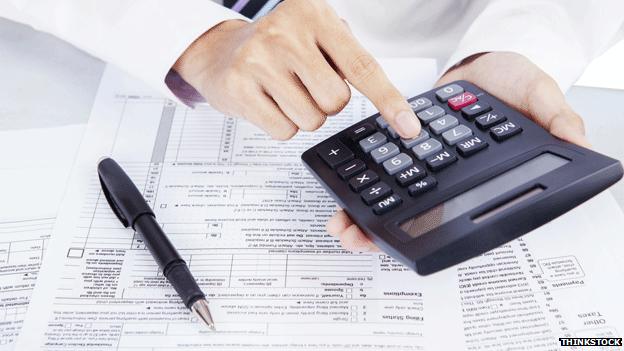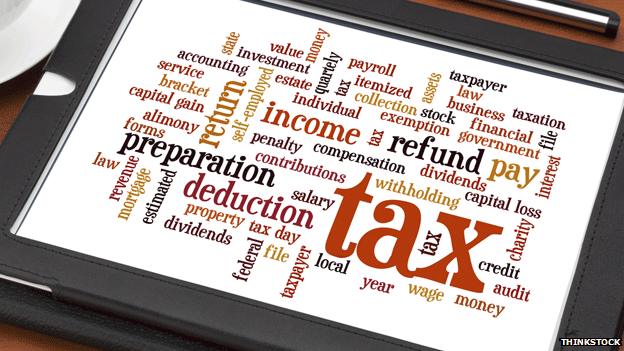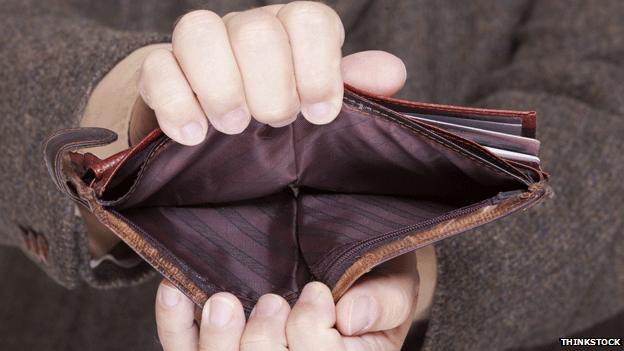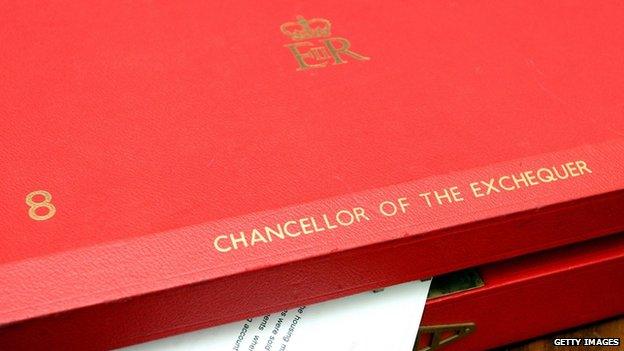Daily question: Would taxes go up or down in an independent Scotland?
- Published
As the people of Scotland weigh up how to vote in the independence referendum, they are asking questions on a range of topics.
In this series, we are looking at those major questions and by using statistics, analysis and expert views shining a light on some of the possible answers.
Here, we tackle the question of tax and examine whether rates could go up or go down in an independent Scotland.
Do you have a referendum question? Let us know by....
Emailing newsonlinescotland@bbc.co.uk.
We can also be found on Twitter @bbcscotlandnews, external
And on Facebook, external.
BBC news website users have been asking questions about taxes and the tax system, including from Gordon Bauwens, Andy Davis, Geoff Ross, Robert Frew and Charles Hallatt.

Would I pay more tax in an independent Scotland or in the UK?

That depends on four big factors......
FIRST - it depends on how much you earn. If you're a HIGH earner, for instance, you may find tax being raised, depending on whether the governments at Westminster or Holyrood decide to redistribute from high earners to the poor.
SECOND - Holyrood would have the power to change the tax system, though with some constraints placed on it by international agreements.
THIRD - Westminster's tax regime changes a bit every year. As with pensions in the Budget last March, it sometimes changes a lot. So, even if the Scottish government kept all taxes the same, the two systems are likely to diverge over time. That should be no surprise. Making different choices at Holyrood about taxation and spending is one of the main arguments for independence.
FOURTH - Here is a tricky question - whether Scotland's total tax bill is likely to rise more if Scotland stays in the UK or becomes independent. That requires some guesswork about the future path of tax revenue, the choices the electorate make in future, and which parties get elected to government.

How much freedom of choice would an independent Scotland have?

International agreements would place some constraints on tax levels, and there could be further constraints imposed following negotiations.
The EU limits the amount that VAT can be varied, between 15% and 25%. In the UK, it's now 20%, but some items, including food, children's clothes and newspapers are "zero-rated" - that is, a special EU opt-out for the UK allows for no VAT on these. Some critics of independence plans suggest that opt-out may not be retained for an independent Scotland.
In talks on Scottish membership of the EU, other member countries may also push to limit how much Scotland could undercut business taxation to compete with other EU nations. Several of them don't like the advantage Ireland gained by having a very low corporation tax rate.
And if there's to be a deal on a currency union with the rest of the UK - a very contentious "if" - both sides anticipate conditions being written into it, starting with a limit on how much of a government deficit Scotland can run, and how much it can borrow.
But the biggest consideration when setting taxation and spending levels in Scotland is how much it costs to deliver public services and future manifesto commitments.
It will come as no surprise that the campaigns for and against independence have very different views on this, and some variation within the "Yes" campaign.

What is "Yes" saying?

The White Paper, external says that tax will stay the same until a new government, elected in 2016, chooses how to change it. It anticipates HM Revenue and Customs continuing to collect tax until that role is taken over by the new Revenue Scotland.
The current administration wants to use tax powers to improve economic growth and fairness, as well as simplifying tax and making it more difficult to avoid. It claims that it could raise £250m a year more, without increasing tax rates.
But what about paying the bills? The Scottish government plans to cut spending on defence. Depending on the outcome of negotiations with Westminster, it may also have less to spend on servicing a Scottish share of UK government debt, which currently runs to more than £4bn per year.
It has also said it wants to cut corporation tax to three percentage points below the UK level (which has been sharply cut in recent years). And with the powers of independence, it wants to cut Air Passenger Duty.
There are others in the "Yes" campaign who have more radical plans for redistribution of income using the taxation and benefits system as well as a minimum "living wage". Tackling income inequality is one of the main planks of the "Yes" campaign.
While there are several new spending commitments in the White Paper, it states: "There is no requirement to increase the general rate of taxation to pay for the services we currently enjoy in Scotland."

What is "No" saying about tax?

The "No" campaign points to the findings of work by the Institute of Fiscal Studies, external, which projects that an independent Scotland's public finances would start, in 2016, facing a bigger deficit than the UK as a whole.
The "No" campaign claims this would require a rise in Scottish tax revenue, or a cut in spending, of around £6bn.
That's a big number. Where does it come from? Well, it's the IFS estimate of what Holyrood would have to do in 2021, if it's to tackle long-term spending pressures, reversing the rise in debt and getting debt down to 40% of national income by 2060.
The equivalent figure for the UK as a whole is £13bn.

Why are there such wide variations in forecasts?

As a percentage of the UK, Scotland contributes 8.2% in taxes. The graphic shows some of the larger taxes - including income tax, tobacco and alcohol duties and the climate change levy
As in any economic model, there are variables. And with any forecast, you have to make assumptions. In the case of Scottish independence, the difference between the assumptions about these variables is very wide, external.
Oil and gas revenue depends on market prices, on production levels, on production costs and, after taking all those into account, on profits. The price has been unusually stable in recent years, but output has fallen and costs have risen steeply.
The Office of Budget Responsibility has downbeat forecasts based on recent experience. The Scottish government has a more upbeat range of forecasts based on recent industry investment.
There are also different assumptions on how much UK government debt is taken on by Holyrood. It could cost more than £4bn per year, or there may be no debt transfer. The latter could put Scotland into surplus, if others things also turn out positively - though a refusal to take on debt could have other, less welcome effects.
Then, there are the costs of setting up an independent Scotland. No one has reliable figures on that. The Scottish government agrees with a rough estimate that it might be £200m. An economic think tank in London says it could be more than 10 times as much.
The optimistic public finance outlook of the Scottish government is also based on three policies working out well;
securing a rise in productivity
a rise in the working population, with higher immigration and Scots attracted not to leave
and using improved childcare to bring more parents into the workforce.
These would be policies to be worked out by the new Scottish government due for election in May 2016. That government will have its own priorities on taxation, spending and borrowing, how much it will choose to differ from the deficit-reduction plans at Westminster, and how it chooses to address a set of demographic and pension challenges that face governments across Europe.

What is likely to happen to taxation in the UK?

The Better Together campaign is saying less about taxation than it is about Scotland's spending profile. That's partly because the three main parties have different approaches for the future of the UK.
Labour has disagreed with the coalition parties over spending cuts. And one of the big debates ahead of the May 2015 Westminster election is how much further and how fast to cut spending or to raise taxation to bring Britain's deficit down, and to start paying off debt.
The Chancellor, George Osborne, has talked about needing to make cuts of £25bn, roughly half of that from welfare. And the IFS says much of the cutting of public expenditure is not going to start until after the next Westminster election.
It has also stated that the extent of change to the public finances since 2010 will have to be repeated, though over a longer period, if the UK is to adjust to demographic challenges of providing services and pensions for a larger number of older people.
Unlike any previous election to the Scottish Parliament, the 2016 election will include a similar debate about choices between taxation and spending.
If that is the first election for an independent Scotland, that's because it will have a wide range of powers and a lot of commitments to spend. It will almost certainly inherit a deficit, and may face pressure from the bond markets to have a clear plan for getting it down.
If the referendum vote is "No", there will still be new taxation powers for consideration, under the Scotland Act 2012. That allows MSPs to vary the income tax rate Scots pay, as well as setting the levels of a new tax to replace stamp duty on house and land sales.
For further reading, consult these documents...